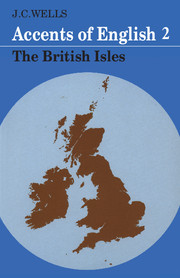5 - The Celtic countries
Published online by Cambridge University Press: 05 June 2012
Summary
Wales
Introduction
There are places in Wales which have been English-speaking for centuries – the Pembroke area, for example, on the southern coast of Dyfed. But they are the exception rather than the rule. Although ordinary Welshmen have had some acquaintance with English since the Middle Ages, they have not had it as their mother tongue, as their first language, until quite recently – a matter of a century or two. In looking at the pattern of English in Wales today, one must remember that North America, for instance, has had a substantial body of native English speakers for longer than Wales has. Welsh English, as a native language, is mostly not much older than South African English.
Nowadays virtually everyone in Wales can speak English. But for a significant minority English is only a second language. These are the native speakers of Welsh, perhaps the most viable of the Celtic languages; in spite of the inroads made by English, particularly over the last hundred years, they still comprise something like 20 per cent of the Principality's total population of about two and three-quarter million. Many of the English-speaking majority, too, have some knowledge of Welsh. In many cases their parents, or at least their grandparents, spoke it. No one who lives in Wales can fail to notice the Welsh language around them, no matter whether they consider it a valuable element of their national and cultural heritage or a tiresome irrelevance rammed down their throats by chauvinist cranks.
- Type
- Chapter
- Information
- Accents of English , pp. 377 - 450Publisher: Cambridge University PressPrint publication year: 1982



